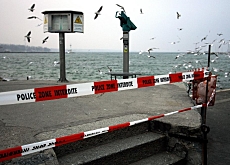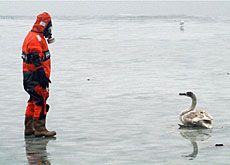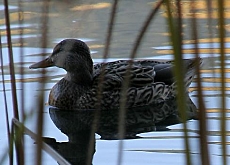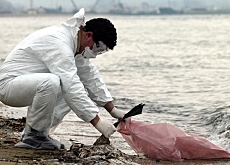Bird flu arrives in Switzerland

A first case of avian flu has been detected in Geneva – with two further positive tests reported just across the German border near the Swiss town of Stein am Rhein.
The federal authorities believe a dead duck found in Geneva was likely infected with deadly H5N1 strain, but have called for calm.
Cantonal authorities in Geneva, Schaffhausen and Thurgau have ordered a three-kilometre protection zone and an observation zone of 10km.
“We are contemplating the worst case,” commented Hans Wyss, director of the Federal Veterinary Office at a news conference in Bern on Sunday afternoon.
He said that tests would have to be sent off before a definitive result was known.
“We can only make the tests in Switzerland for the H5 [virus]. That’s why we’ve sent them to the reference laboratory in Britain. It might take several days before the results are known.”
Calm
At the same time, the director of the health office, Thomas Zeltner called for calm.
“Panic reactions are just not called for… But people should not touch dead birds and should wash their hands after contact with a bird,” he said.
His plea was later echoed by Swiss Economics Minister Joseph Deiss, who is reponsible for agriculture.
“It would be a mistake to panic now. But it would also be an error not take the necessary precautionary measures.”
He advised consumers on French-language Swiss radio that eating eggs or poultry presented no dangers.
The country’s first case of bird flu concerned a dead goosander duck found in the port of Geneva last Wednesday alongside three other dead birds.
The diving ducks – members of the sawbill family – visit western Europe every year, with about 1,500 spending winter on the lake.
Wyss said that the entire Swiss section of Lake Constance in the north would be placed under higher surveillance after two cases of bird flu were reported just across the border in Germany.
Tests have also been taken to determine whether the affected birds were carrying the H5N1 strain.
No surprise
The arrival of avian flu in the country has come as no surprise to the authorities.
Wyss said that the news was not a catastrophe. In a newspaper interview he had said that the risk of humans catching the virus without direct contact with infected birds was practically non-existent.
Zeltner from the health office said Switzerland had been surrounded by avian flu for some time. It would have been a huge stroke of luck if an infected bird had not found its way here, he said.
His office is to present a plan in March in the case of the flu turning into a pandemic disease among humans.
The measures will make it clear to the cantons how to deal with the situation, including which hospitals will be available for putting people into quarantine and who will be treated with Tamiflu, the oral antiviral treatment of Switzerland’s Roche pharmaceuticals company.
Bird flu remains essentially an animal disease, but has killed more than 90 people since late 2003. Victims contract the virus through close contact with infected birds.
swissinfo with agencies
There are 30,000 poultry farmers in Switzerland with eight million hens, geese and ducks.
The authorities ordered all poultry to be confined indoors from last Monday.
The first confinement lasted from October 25 to December 15, 2005.
Information telephone lines: +41 31 322 21 00 and +41 31 322 21 99.
The first known case of a human contracting the deadly H5N1 strain of bird flu was in Hong Kong in 1997.
It spread in the following years to about a dozen other Asian nations, and arrived in Europe – Turkey, Romania and Croatia – last year.
The first cases were registered in Africa at the beginning of this month.
The H5N1 virus was found in dead birds in six European countries, including France, Italy, Germany and Austria.
Around 170 people have contracted the disease worldwide, and more than 90 of them have died.

In compliance with the JTI standards
More: SWI swissinfo.ch certified by the Journalism Trust Initiative



You can find an overview of ongoing debates with our journalists here. Please join us!
If you want to start a conversation about a topic raised in this article or want to report factual errors, email us at english@swissinfo.ch.